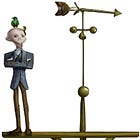Questions are never indiscreet. Answers sometimes are.
Oscar Wilde
You know the saying, “there are no stupid questions,” right? As a college professor for three decades, I can assure you that there are, indeed, stupid questions and a wide variety of them to boot. I know this personally because I have asked my share. Nonetheless, any question, even a silly one, is better than none at all. Questions of all types can lead us to knowledge and truth like a bright beam in the night. Without questions, we are left to dwell in darkness, which kind of undercuts the whole objective of learning. That’s why good teachers entertain all questions, even the stupid ones.
Some time ago, I told you about my sixth-grade teacher, whose python-like hostility to curiosity pretty much crushed all the questions out of the rest of my scholastic career.
In that piece I mused, “What sort of a mind is so easily challenged and sent into crisis by another’s question?” The answer is simple: a boss’s mind. Bosses hate questions, so my sixth-grade teacher was just a sort of proto-boss in a lifelong line of bad bosses.
“Uh-oh,” you may be thinking. “Here he goes again trashing bosses! Are all bosses really so bad?” Yes. Yes they are. Remember, when I say “boss,” I’m not referring to the position held but to the mindset. To be “like a boss” is to stand in opposition to the virtues of leadership.
Therefore, bosses generally hate questions because, in their narrow thinking, questions, even when they ask them, are a sort of trap. From the typical boss’s perspective a questioning employee represents several possible threats in any combination:
The employee wants to force the boss to commit to something, to take responsibility, or, at the very least, produce a credible answer. These are the very circumstances bosses spend all day evading!
The employee may be challenging the boss’s authority, and there is nothing more disturbing to a fragile boss than having their authority challenged.
Whatever the case, dealing with a question, any question, will require the boss to devote time, time the boss would rather spend doing super important boss things, such as blaming others or micromanaging.
But, let’s say the boss is the one with a question. Bosses fear that asking questions may make them seem confused, ignorant, and weak. That’s why so many bosses’ questions are actually lightly disguised accusations or threats: “When are you going to get that Fluggenhopper report to me, Jenkins? Don’t you know I have an early tee time tomorrow?”
No, no. For the boss, questions, no matter the source, are out of the question. Questions are the typical boss’s kryptonite!
Then again, for leaders, those very same questions are like a superpower. Great leaders are great learners, so they ask questions to understand new stuff and build strong relationships. Moreover, leaders don’t shy away from their people’s questions, including tough questions. It can be harrowing, even painful to stand in front of a packed room while someone questions your words, actions, or motivations. The boss will shut down questioning to protect their fragile ego, but the leader takes that ol’ ego, stuffs it in a sack, and tosses it in the river.
The leader faces questions—even ill-informed, disrespectful, or misleading questions—with patience and equanimity. It’s hard, even agonizing, and I know I have not always reacted well when I have been in that situation. By asking and receiving questions, though, the leader can build foundations, tear down walls, and erect bridges. Being open to questions also serves as a check on a leader’s power, which is humbling and clarifying, repositioning the leader in service to the organization and away from the temptation to act as yet another mere boss.
Leaders lead by establishing mutual trust with their people, and you can’t trust others or be trusted if you’re afraid of questions. That’s why bosses hate questions. Questions make you vulnerable, and to the weak minded vulnerability is weakness.
The leader understands that the act of asking and receiving questions is really a source of strength: strength of mind, strength of character, and strength of relationships. Leaders welcome questions the way superheroes embrace their destiny.
One person’s kryptonite is another’s superpower. The difference is what resides inside the person. The true leader trusts themself and trusts their people, welcoming and asking questions. Remember, questions are key to learning. They are how we discover and create. They are how we relate. Avoiding or suppressing questions does just the opposite—darkening, destroying, and isolating.
So the next time you want to ask a question or a question is asked of you, greet it as the opportunity for growth and connection that it is. Embrace the superpower of questions, and you'll find yourself soaring as a leader!
How open are you to asking and receiving questions? How can you make questions a key part of your leadership practice?
Leaders need to understand the challenges and opportunities that questions represent, and I can help.
If you want to learn more about how to become a great leader in this world of bad bosses, visit GuidanceForGreatness.com.
Join the conversation by leaving a comment, and leave a like or review.
Please share this post on social media.
And be sure to SUBSCRIBE to have On Leading with Greatness sent weekly to your inbox.



















Share this post